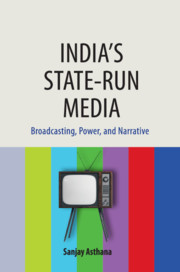Book contents
- Frontmatter
- Dedication
- Contents
- List of Figures and Tables
- Acknowledgements
- Introduction
- 1 Broadcasting, Spatiotemporalities, and Power
- 2 Doordarshan, Literary Drama, and Narrative Identity
- 3 Televisual Representations of Socio-Spatial Conflicts, and the Religious–Secular Imaginaries
- 4 Patriotism and Its Avatars: Tracking the National–Global Dialectic in Music Videos and Television Commercials
- 5 Remembering Doordarshan: Figurations of Memories and Nostalgia on Blogs, YouTube, and in Oral Interviews
- Epilogue
- Bibliography
- Index
2 - Doordarshan, Literary Drama, and Narrative Identity
Published online by Cambridge University Press: 08 May 2019
- Frontmatter
- Dedication
- Contents
- List of Figures and Tables
- Acknowledgements
- Introduction
- 1 Broadcasting, Spatiotemporalities, and Power
- 2 Doordarshan, Literary Drama, and Narrative Identity
- 3 Televisual Representations of Socio-Spatial Conflicts, and the Religious–Secular Imaginaries
- 4 Patriotism and Its Avatars: Tracking the National–Global Dialectic in Music Videos and Television Commercials
- 5 Remembering Doordarshan: Figurations of Memories and Nostalgia on Blogs, YouTube, and in Oral Interviews
- Epilogue
- Bibliography
- Index
Summary
It has been over half a century since television was instituted in India. Although scholarship on Indian television has provided valuable insights into its structural, textual, and reception contexts, a sustained examination of its narrative forms, for the most part, remains unexplored. In addition, a significant number of television serials translated from literary works have not been studied. In this chapter, I argue that a critical study of television's narrative forms that looks at how its repertoire of cinematic codes, techniques, and styles involve a complex overlapping between myth, realism, and melodrama will enable a better theoretical understanding of Indian television. In what follows, I discuss the television serials Mailā Anchal (1987–88, dir. Ashok Talwar), Rāg Darbārī (1986–87, dir. Krishna Raghav), and Godān (2004, dir. Gulzar) transmitted on the state-run television network, Doordarshan. These serials, adapted from literary works, deal with questions of late colonial and postcolonial identity in the countryside in terms of the dialectic tensions between the forces of tradition and modernity, local politics, nationalism, development, encroaching capitalism, public life, and more specifically, on the human condition. They frame the various issues through complex ‘mythic-realist’ narrative forms. For instance, the literary adaptations look at the effects of the process of development—through local (rural) politics, state institutions, and bureaucracies—in the lives of ordinary Indians, mostly peasants and working class. Both a critique and valorization of anti-colonial and postcolonial nationalism, the television serials portray the stories and plots in terms of a complex interplay between religious beliefs and practices and the secular vocabularies of public institutions. The main focus of this chapter is to explore the ‘ways’ through which the literary works (novels) are translated for Doordarshan and the presence of pre-capitalist performative practices in the televisual reconfigurations of myth and realism. Indeed, in the present moment of globalization and ‘neoliberal’ conjuncture in India, and in the larger contexts in which scholars have characterized television as part of the machinery of capitalism, it is crucial to develop critiques to engage with forms of television. This chapter offers such a critique by exploring specific forms of literary-based televisual narratives.
- Type
- Chapter
- Information
- India's State-run MediaBroadcasting, Power, and Narrative, pp. 63 - 82Publisher: Cambridge University PressPrint publication year: 2019



